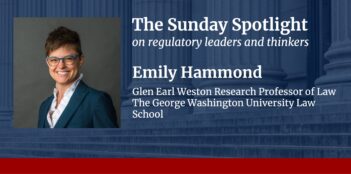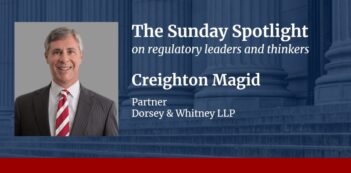
Scholar calls for greater oversight and enforcement of corporate net-zero carbon emissions pledges.
What do Facebook, McDonald’s, and Shell all have in common? They, along with thousands of other corporations, have all pledged to achieve net-zero greenhouse gas emissions by 2050.
Many of these corporate pledges, however, are not worth the paper they are written on, worry some environmentalists and scholars. Given this concern, government agencies such as the U.S. Securities and Exchange Commission (SEC) and the Federal Trade Commission (FTC) should take steps to hold companies accountable for their net-zero carbon emission goals, argues Albert Lin, a law professor at the University of California Davis School of Law.
Lin recognizes that net-zero goals play an “increasingly important role in the battle against climate change,” yet warns that “indeterminate and varied” commitments will do little to speed up the transition toward renewable energy. A key problem is that net-zero pledges take on many forms—from binding, governmental commitments to aspirational statements of corporate policy. Furthermore, some companies intend to reach net-zero by relying solely on emission-free energy sources, whereas others plan to pay to remove carbon from the atmosphere to offset new emissions.
Lin explains that net-zero pledges face minimal regulatory oversight and companies seldom release public disclosures specifying how they intend to achieve net-zero carbon emissions. He finds it unsurprising that skeptics dismiss corporate net-zero pledges as little more than greenwashing—the making of exaggerated or false claims about climate initiatives.
Some critics go so far as to claim that net-zero pledges actually stymie the transition to renewable energy by allowing companies to deflect criticism and forestall other, more effective forms of regulation.
Lin urges the SEC to increase oversight of climate-related corporate disclosures. Federal securities law already requires publicly held companies to disclose information that a “reasonable shareholder would consider important in deciding how to vote” and separately mandates disclosure of the risks associated with climate change. The existing SEC disclosure requirements, however, do not capture future-oriented objectives such as net-zero goals.
Nonetheless, Lin says that heightened climate-related disclosure requirements could promote follow-through by making it easier for the public to hold companies accountable.
Lin points to a recent SEC proposal that, if adopted, would require companies to disclose their greenhouse gas emissions and emission reduction plans. Although disclosure requirements would not make net-zero pledges legally enforceable, they would facilitate standardized reporting, which in turn could help the public compare corporate pledges and distinguish between genuine commitments and greenwashing, he argues. Furthermore, Lin notes that when the public is aware that a company has not upheld a net-zero pledge, the associated reputational harm may threaten sales revenue or undermine the company’s ability to attract employees.
Lin argues that litigation also has a central role to play in enforcing corporate net-zero pledges. The Securities Exchange Act of 1934 makes it unlawful “to use or employ, in connection with the purchase or sale of any security … any manipulative or deceptive device,” including an untrue statement or omission of a material fact.
Although Lin recognizes that courts may be hesitant to hold companies liable under this statute for predictive or aspirational statements, he says that investors’ increasing interest in climate-related disclosures suggests that courts may start considering net-zero pledges material. Lin also underscores that companies can be held liable for forward-looking statements that were false at the time they were made.
Federal consumer protection laws offer another avenue through which agencies can pressure companies to uphold their net-zero pledges, Lin states. The Federal Trade Commission Act authorizes the FTC to prosecute “unfair or deceptive acts or practices in or affecting commerce.”
Although it remains to be seen how receptive the FTC will be to policing misleading or disingenuous net-zero pledges, Lin says that some environmental groups see consumer protection laws as a promising enforcement mechanism. For instance, environmental nonprofits recently filed a complaint with the FTC alleging that Chevron overstated its commitment to investing in renewable energy and limiting its fossil fuel pollution.
Lin observes that state consumer protection laws that prohibit unfair and deceptive trade practices may also prove effective in holding corporations accountable for their net-zero pledges. Vermont, for example, recently filed a complaint alleging that advertisements produced by multiple oil companies constituted unfair and deceptive trade practices.
Likewise, Massachusetts has alleged that Exxon Mobil’s deceptive greenwashing campaigns violated state consumer protection laws. These lawsuits, Lin contends, could “lay the foundation for future allegations that a company’s net-zero pledge constituted unlawful greenwashing or deceptive marketing.”
Although net-zero pledges have a “pivotal role” to play in accelerating the energy transition and combating climate change, Lin argues that such commitments must “constitute more than vague promises.” Enforcement mechanisms such as disclosure requirements, securities fraud, and consumer protection litigation have the potential to translate voluntary corporate pledges into meaningful emissions reductions, he argues.
Without greater enforcement, Lin warns, corporate pledges may remain mere empty promises.



